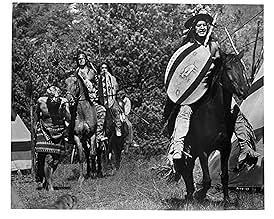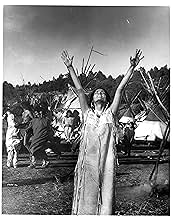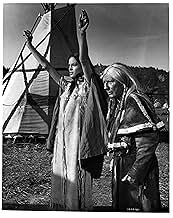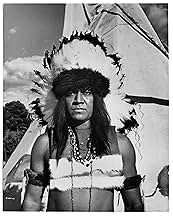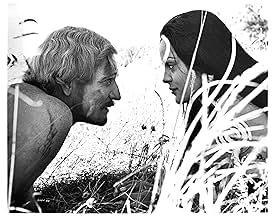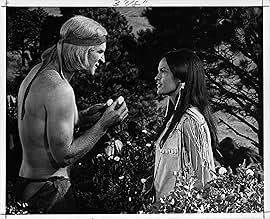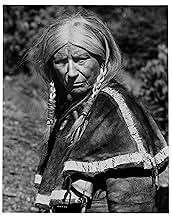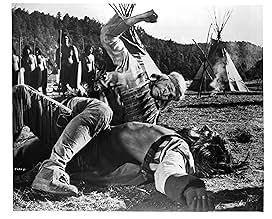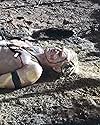IMDb-BEWERTUNG
6,8/10
9886
IHRE BEWERTUNG
Ein englischer Aristokrat wird von amerikanischen Ureinwohnern gefangen genommen. Er lebt mit ihnen und beginnt, ihre Lebensweise zu verstehen. Schließlich wird er als Teil des Stammes akzep... Alles lesenEin englischer Aristokrat wird von amerikanischen Ureinwohnern gefangen genommen. Er lebt mit ihnen und beginnt, ihre Lebensweise zu verstehen. Schließlich wird er als Teil des Stammes akzeptiert.Ein englischer Aristokrat wird von amerikanischen Ureinwohnern gefangen genommen. Er lebt mit ihnen und beginnt, ihre Lebensweise zu verstehen. Schließlich wird er als Teil des Stammes akzeptiert.
- Regie
- Drehbuch
- Hauptbesetzung
- Auszeichnungen
- 1 Gewinn & 2 Nominierungen insgesamt
Judith Anderson
- Buffalo Cow Head
- (as Dame Judith Anderson)
Lina Marín
- Thorn Rose
- (as Lina Marin)
Empfohlene Bewertungen
Although this film appeared to be a western for the 1970's, the story was not new. The writer, Dorothy M. Johnson, originally wrote it for the T.V. series Wagon Train (1957-65). Ralph Meeker was cast then in the Richard Harris role, and an excellent job he made of it, in his quiet way. A good story will always stand the test of time, as this proves.
In 1825, the Sioux, leaded by Yellow Hand (Manu Tupou), capture the English nobleman John Morgan (Richard Harris), while hunting in the United States of America. John is brutally treated like an animal by the Indian, and is given to help Buffalo Cow Head (Judith Anderson), the mother of Yellow Hand, as if he were a horse. Without understanding the language and behavior of the Sioux, he is helped by Batise (Jean Gascon), a white man made prisoner and mutilated by the Indians five years ago. Batise translates and explains the Sioux's culture for John, plotting to escape some day back to the civilization with him. After an undefined long time later, John loses his snobbish behavior and is reasonably integrated to the Sioux. One day, he kills two enemies Shoshones, who were spying and stalking the Sioux, and gains the respect of the Sioux and love of the sister of Yellow Hand, Running Deer (Corinna Tsopei). John marries Running Deer and integrates to their culture, and after a tragic attack of the Shoshones to the Sioux tribe, he becomes their leader. "A Man Called Horse" is a spectacular and powerful classic western of the 70's. The first time I saw this movie, I was a teenager and left the theater completely astonished with such a different story in that time and the violence of the scenes. Two days ago, I bought the VHS and yesterday I saw it again, and it is still a very impressive film, with magnificent performances of the cast, highlighting Richard Harris and Judith Anderson. The production is very careful, being mostly spoken in Sioux, and depicting in a realistic way, the life, the behavior, the common laws and the moral practices of the Sioux. I believe that "A Man Called Horse", with the Sioux, "Soldier Blue", with the Cheyenne and "Little Big Man", all of them from 1970, were among the first movies to show the lives of prisoners of the North American Indians in their tribes. The amazing scene of John Morgan suspended by his chest in an Indian ceremony is unforgettable and very impressive. My vote is ten.
Title (Brazil): "Um Homem Chamado Cavalo" ("Spectacular Classic Western")
Title (Brazil): "Um Homem Chamado Cavalo" ("Spectacular Classic Western")
A MAN CALLED HORSE (4 outta 5 stars)
Classic western epic stars Richard Harris as an English nobleman on holiday in the American wilderness who gets taken captive by a band of American Indians. He is brutally treated at first but his captors come to accept him as one of the tribe as he gains more knowledge of their different way of life... where one needs to earn his/her place in the hierarchy... unlike British aristocracy. Harrowingly violent scenes may make this film tough to watch for some... but Harris gives one of his usual great performances and the movie provides an atypically (for its time) sympathetic depiction of the Native American people. Much more realistic but just as sincere as that other 70s classic "Little Big Man."
Classic western epic stars Richard Harris as an English nobleman on holiday in the American wilderness who gets taken captive by a band of American Indians. He is brutally treated at first but his captors come to accept him as one of the tribe as he gains more knowledge of their different way of life... where one needs to earn his/her place in the hierarchy... unlike British aristocracy. Harrowingly violent scenes may make this film tough to watch for some... but Harris gives one of his usual great performances and the movie provides an atypically (for its time) sympathetic depiction of the Native American people. Much more realistic but just as sincere as that other 70s classic "Little Big Man."
I first saw this film in the theatre when it came out in 1970. It was a welcome departure from earlier films about pioneers sitting among their circled wagons shooting whooping Indians like ducks in an arcade.
I saw it last weekend for the first time since, and I think that it holds up well. Whatever the flaws, it is a reasonably good depiction of Dakota Sioux going about their business in the 1820s.
This movie demonstrates that a story can be told with very little dialog and a lot of non-verbal expression. Harris might be the most prominent character but, cumulatively, the cast of small characters weighs in just as heavy.
I saw it last weekend for the first time since, and I think that it holds up well. Whatever the flaws, it is a reasonably good depiction of Dakota Sioux going about their business in the 1820s.
This movie demonstrates that a story can be told with very little dialog and a lot of non-verbal expression. Harris might be the most prominent character but, cumulatively, the cast of small characters weighs in just as heavy.
at the beginning of this movie,there is a blurb about how the events portrayed are taken directly from historical documents of the period.the South Dakota Sioux Indians also had a lot of input into the movie.so,we can assume it is fairly accurate.one thing it does is show the Native American Indians as being just like any other people.this movie took awhile to get going,in my mind,but once it does,it's action packed,and it's very well acted.Richard Harris is the title character.he is a British Lord who is captured by the Sioux in the mid 1800's.first he is treated with disdain,as nothing more than a servant to the aging mother of the chief.gradually,though,things change,though,and he becomes much more.this is a very touching and heart breaking movie.it's also very thought provoking.overall,i give A Man Called Horse a 6/10
Wusstest du schon
- WissenswertesThe story is based on the experience of Cabeza de Vaca, a Spanish soldier captured by indigenous Americans in 1528.
- PatzerThroughout the film the actress playing Running Deer can be seen with medium long, nicely manicured fingernails.
- Alternative VersionenOld German VHS version includes many alternate/more violent takes that are not on the US DVD (whereas the version on the DVD is the same as in the US), especially the ending is almost completely recut. On the other hand the US version includes a few lines which are not in the German version.
- VerbindungenEdited into Commercial Entertainment Product (1992)
Top-Auswahl
Melde dich zum Bewerten an und greife auf die Watchlist für personalisierte Empfehlungen zu.
Details
- Erscheinungsdatum
- Herkunftsländer
- Sprachen
- Auch bekannt als
- Un hombre llamado Caballo
- Drehorte
- Produktionsfirmen
- Weitere beteiligte Unternehmen bei IMDbPro anzeigen
Box Office
- Bruttoertrag in den USA und Kanada
- 1.941.247 $
- Weltweiter Bruttoertrag
- 44.000.000 $
- Laufzeit1 Stunde 54 Minuten
- Sound-Mix
- Seitenverhältnis
- 2.35 : 1
Zu dieser Seite beitragen
Bearbeitung vorschlagen oder fehlenden Inhalt hinzufügen


